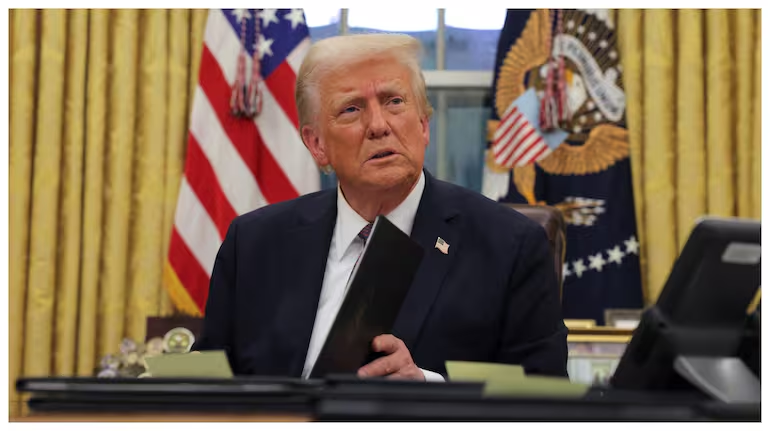Former U.S. President Donald Trump has expressed strong disapproval of the United Kingdom’s request for Apple to grant access to user data, likening it to China’s surveillance practices. In an interview with The Spectator published on Friday, Trump stated that he had personally warned British Prime Minister Keir Starmer against such measures, calling them an overreach of government power.
Speaking to The Spectator’s editor-at-large, Ben Domenech, Trump said, “We actually told him (Starmer) … that’s incredible. That’s something, you know, that you hear about with China.” The comments mark Trump’s first magazine interview of his second term in office.
A Controversial Request Sparks Debate
The UK government has reportedly pressured Apple to provide access to encrypted user data, sparking privacy concerns and international debate. The issue was a topic of discussion when Trump and Starmer met at the White House on Thursday. The meeting, their first since Trump resumed office, also covered key issues like the ongoing conflict in Ukraine and negotiations for a bilateral trade agreement.
Apple and the UK government have yet to respond to the controversy. Reuters confirmed that both parties did not immediately provide comments when approached for clarification.
Apple’s Unprecedented Move
In response to the UK’s demands, Apple last week disabled an advanced security encryption feature for iCloud data for UK users. The decision marks a rare instance where Apple has altered its global security policies to comply with governmental pressure.
A spokesperson for Britain’s Home Office declined to comment on whether a formal request for data access had been made. However, privacy advocates and tech experts have raised concerns that such demands could set a dangerous precedent, potentially leading to similar policies in other countries.
Privacy vs. Security: A Global Debate
The controversy highlights a growing global debate over the balance between user privacy and national security. Governments argue that access to encrypted data is essential for tackling crime and terrorism, while tech companies and civil liberties groups warn against potential abuses of power.
Trump’s comments align with his historically strong stance on digital privacy and government surveillance. During his previous term, his administration frequently clashed with tech giants over privacy regulations and data-sharing policies.
Reactions from the Tech Industry and Experts
Cybersecurity experts have criticized the UK’s approach, warning that weakening encryption could expose users to cyber threats. “When governments demand backdoor access, they create vulnerabilities that bad actors can exploit,” said Alex Stamos, a former Facebook security chief.
Edward Snowden, the whistleblower known for exposing global surveillance programs, also weighed in. “This is exactly the kind of overreach that puts everyday citizens at risk while failing to stop real threats,” he posted on social media.
As the debate unfolds, Apple’s response to government demands in other countries will be closely watched. With major economies such as the U.S., UK, and EU pushing for expanded digital surveillance powers, privacy advocates warn that tech companies may face increasing pressure to compromise user security.
For now, the UK’s request remains a contentious issue, with Trump’s remarks adding further weight to the discussion. As governments and tech giants continue to battle over digital privacy, the outcome of this dispute could set a precedent for years to come.
For more updates on international tech policy and privacy rights, visit Coleman News.


